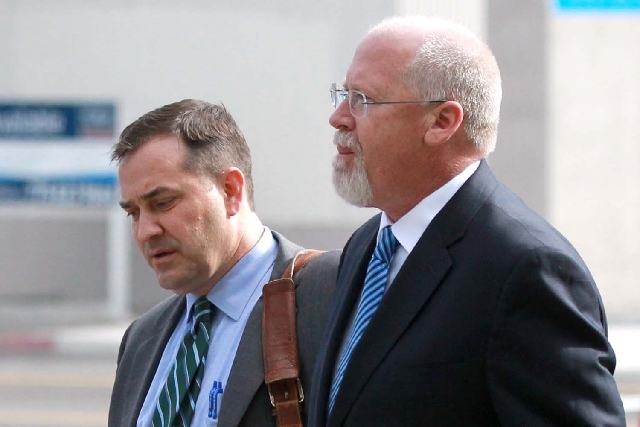Questions persist in Whittemore case

Among many things that make no sense to me: Why was lobbyist Harvey Whittemore charged criminally instead of civilly?
I’m not challenging the jury’s verdict that Whittemore did what the government said he did. He funneled more than $133,000 to family, friends and their spouses with the understanding they would use it to fatten U.S. Sen. Harry Reid’s war chest in 2007. There’s no mystery there. The paper trail alone damned him.
Whittemore couldn’t claim ignorance of the law. First, he’s a lawyer. Second, he knows state and federal campaign laws quite well because he has been a campaign donor for decades.
But why was Whittemore indicted, when other Las Vegans were fined by the Federal Election Commission?
Developer Jim Rhodes was fined $159,000 in 2006 in a case handled by the FEC. He had given money to 14 of his employees to contribute to congressional candidate Dario Herrera ($27,000) and Reid ($10,000).
In 1998, Ray Norvell, a liquor distributor, was charged criminally and by the FEC for making $10,000 worth of illegal conduit donations to Dole for President. He was slapped with a $100,000 fine in the criminal case, and he and the liquor company were fined a total of $60,000 by the FEC.
The Reno jury convicted Whittemore of making unlawful campaign contributions to Reid, making contributions in the name of another and causing a false statement to be made to the FEC. They couldn’t agree on whether he lied to the FBI.
Under today’s laws, since 2010, Whittemore could create a political action committee to help Reid and fund it with his own money without going through the sham of giving the money to others to donate to Reid.
U.S. Attorney Dan Bodgen issued a tough statement after Wednesday’s verdict. “Persons who knowingly violate campaign contribution laws will be investigated and prosecuted to the full extent of the law. Campaign laws exist to level the playing field. The public deserves to know that these laws are not just ‘on the books,’ and that persons with power and money who abuse the system for their own benefit will be prosecuted.”
Was Whittemore doing it for his own benefit or Reid’s, or a little of both?
At a news conference after the verdict, Whittemore said that after he prevails on appeal, he will tell everybody “the complete and true story of exactly how this happened, why this happened, who was behind this and how it got started.”
How it got started is already known. Las Vegas attorney Richard Wright, representing Whittemore’s former land development partners Thomas and Albert Seeno, provided information about the conduit contributions to the government. Whittemore’s words left an impression the feds were looking for bigger fish.
Bogden, asked why Whittemore was a criminal instead of a FEC case like Rhodes, wasn’t specific in his response. “We would not be able to confirm or deny any investigation of Rhodes,” he said through spokeswoman Natalie Collins. He noted that Norvell and a third Las Vegan, Ramon Desage, were handled criminally.
When U.S. District Judge Larry Hicks sentences Whittemore on Sept. 23, I doubt that Whittemore gets the max — five years in prison for each of the three felonies. I anticipate he will get a whopping fine, probably something higher than Rhodes’ $159,000 and Norvell’s $160,000.
But there is a recent precedent for prison time in conduit cases, and it makes me wonder whether Whittemore should have accepted a plea deal and admitted to a felony despite the negative impact that might have on his law license.
On Friday, William Danielczyk Jr., a Virginia man, was sentenced to 28 months in prison and fined $50,000 for his role in a conduit scheme to help Barack Obama in his senatorial and presidential races. He admitted funneling $186,600 to Obama by reimbursing employees.
Paul Magliocchetti, considered one of the most powerful lobbyists in Washington, D.C., admitted making more than $386,000 in conduit contributions between 2003 and 2008. Federal officials in Virginia said he carried out one of the largest federal campaign finance frauds in history. For that, his 2011 sentence was 27 months in prison and a $75,000 fine.
Those two men took pleas, unlike Whittemore.
For now, Reid isn’t saying anything to the news media about his friend’s conviction. But then, what could he possibly say publicly that wouldn’t enrage his old friend?
Angry friends turning on you can create a lot of damage. Look at what the Seeno brothers did to Whittemore.
Jane Ann Morrison’s column appears Monday, Thursday and Saturday. Email her at Jane@reviewjournal.com or call her at (702) 383-0275.












